Stock and Financial Markets Major Dangers! Massive Opportunities!
Stock-Markets / Financial Markets Feb 04, 2008 - 02:49 PM GMT When the number registrants for our recent online conference eclipsed the 25,000 mark, I was naturally surprised. It was the most widely attended event of its kind in history.
When the number registrants for our recent online conference eclipsed the 25,000 mark, I was naturally surprised. It was the most widely attended event of its kind in history.
But I am not surprised to see that many of the changes we talked about are unfolding so quickly — new highs in gold, the worst job losses in four years, the biggest consumer retrenchment since 9/11, and the most rapid collapse of bond ratings of all time.
If you attended our conference, you got fair warning. But if you missed it, it's not too late to take defensive action. In either case, use this double-length gala issue of Money and Markets as your guide ...
Preview 2008:
Major Dangers and
Massive Opportunities
(Edited Transcript of Online Conference)
Bob Nichols: We are witnessing the convergence of some of the most powerful forces of our lifetime.
We are sandwiched between a credit crunch that's spreading rapidly and a Federal Reserve that's fighting back aggressively ... between investments that are crashing and investments that are soaring ... between major dangers and massive opportunities .
My name is Bob Nichols, TV news anchor and financial journalist for over 30 years; and we're going to tell you about both of those today.
We're going to tell you about the major dangers and how to protect yourself. And we're going to talk about the massive opportunities, with specific recommendations to act on immediately.
These are confusing times. But the Weiss Research analysts we have online with us today are not confused at all. Quite the contrary, they are the ones who warned you about this precise scenario , often in great detail.
I'm talking about Martin Weiss and Mike Larson, editors of Safe Money Report . And I'm talking about Larry Edelson, a contributor to Safe Money and editor of Real Wealth Report .
Go back to their Safe Money Report of January 2007. In that fateful gala issue of one year ago, Martin and Mike wrote: "Home and condo prices will fall across wide swaths of the country. Look for price drops of up to 50%."
Now, one year later, home prices have sunk and condo prices have fallen by as much as 50%.
They wrote: "Mortgage delinquencies and foreclosures could get a lot worse."
Now, one year later, mortgage delinquencies and foreclosures have surged to new record highs.
They warned: "Don't touch housing and construction with a ten-foot pole. That includes subprime lenders like New Century Financial and Countrywide Financial, plus home builders like Centex, Lennar, and KB Home."
Now, look at what has happened to those companies, just in one year:
• New Century Financial is broke.
• Countrywide Financial, the largest mortgage lender in America has come close to bankruptcy and seen its shares fall $45 to $5. Nearly nine-tenths of its value — wiped out!
• Centex, the nation's third-largest builder, has seen its shares fall from the low $50s to $20.
• Lennar, the second-largest builder, has seen its shares plunge from $56 to less than $15.
• KB Home, also one of top 10 builders, has plunged from $56 to $17.
In that landmark Safe Money issue of January 2007, they also forecast how the Fed would respond. They wrote: "In a knee-jerk response to the housing bust, the Fed will flood the economy with cash." And the Fed has done precisely that.
They predicted the U.S. dollar would plunge, and it did. They said gold would surge to $800 per ounce, and it did.
Gentlemen, congratulations! Now, though, investors want to move on — to see, or better, to fore see, the next phase. Martin what's the big picture?

Martin Weiss: A battle between two titanic forces. You've got the market forces that are hitting hard — the housing bust, the credit crunch, the recession. And you've got the Federal Reserve, which will respond with everything it's got.
Bob: What's going to be the outcome?
Martin: A sinking economy in the U.S. and surging inflation at the same time.
Bob: When will that begin?
Martin: It already has begun! The economy is already sinking. Inflation is already surging.
Bob: Martin, I can validate your views just from the officials and experts who have come out with statements recently.
President Bush has admitted that the nation faces "economic challenges" because of rising oil prices, home mortgages and a weaker job market.
Fed Chairman Bernanke has warned that the downturn in the credit and housing markets pose substantial risks to the nation's economic health.
Goldman Sachs has predicted "an outright recession this year." And Merrill Lynch has announced "recession has arrived, or will very shortly."
What's your take on this?
Martin: Three things: First, it means that the real estate bust and credit crunch are going to get a lot worse. Second, it means that the troubles are going to spread to other sectors. And third, never forget that every single one of the sources you just quoted — the president, the Fed chairman, Goldman Sachs and Merrill Lynch — have strong motives to understate the severity of the crisis.
Bob: OK. I'm going to run down a list of key areas investors are interested in and get your forecasts based on all this new data that's pouring out right now. Start with banks.
Martin: Overexposed to real estate. Many bank stocks could fall to practically zero.
Bob: The dollar.
Martin: A further plunge overseas. Plus, for the first time in many years, the danger of a big decline in the dollar's purchasing power here at home as well.
Bob: Oil, gold, silver and other natural resources.
Martin: New record highs.

Bob: Larry, what are your targets for gold and oil in 2008?
Larry Edelson: My next target for gold is $1,000 an ounce, then $1,500. My next target for oil: $120 per barrel, then $150.
Bob: Why?
Larry: You've got a unique convergence of both massive global demand plus the Fed's highly inflationary reaction to the credit crisis — slashing interest rates and pumping money.
Bob: So the way to protect yourself — and profit — from this crisis is by investing in gold, natural resources or foreign currencies, just as you've been saying. Is that still true?
Larry: Absolutely, but there's also another, even more direct way, which we're going to discuss today.
Bob: I know you're ready to release new and exciting recommendations today. But first I want to ask Mike Larson what he sees happening in 2008. What's amazing to me is that despite the speed of recent events, Mike has been, and continues to be, several steps ahead of them.
Mike, for the past two and a half years, you've been extremely pessimistic about the housing situation in the U.S., and rightfully so. Are you still a pessimist?

Mike Larson: Ha-ha. I get the "pessimist" thing all the time. But we're really optimists — because in every danger, we see opportunity. And right now, the profit opportunities are so large precisely because the dangers are so intense.
Look outside your door. Look in your neighborhood. Read today's newspaper. You can't escape the fact that we're in the midst of a final, climactic phase in the housing collapse.
Bob: Which is ...
Mike: The bankruptcy phase — the phase when builders and lenders can't pay their debts, the phase when they file for Chapter 11, when their share prices plunge to zero .
Take Levitt and Sons, for example. They just went broke in November. And look at the shares in their parent company — down from $32 to just $2.
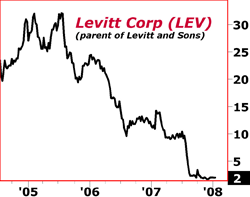
Bob: Isn't Levitt the one that built Levittown in Long Island?
Mike: Yes. And they also built communities in Florida. But then they just quit. They walked away and filed for bankruptcy, leaving homeowners stranded with half-finished homes. No club houses. No facilities.
Next, Technical Olympic or TOUSA, which operates here under the name Engle Homes. It's also on the verge of going under.
Bob: Are they smaller than Levitt?
Mike: No, bigger. Levitt built fewer than 1,700 homes in 2006. But TOUSA built close to eight thousand homes. They could file for bankruptcy protection any day now. [Editor's note: TOUSA filed for Chapter 11 on January 29.]
Then there's WCI Communities, a big condo and single-family home builder. This company dove headfirst into the residential development market here in Florida. Now, guess how far their latest quarterly sales plunged in their tower division!
Bob: To just a few units?
Mike: No, worse. Their sales were minus 81 units.
Bob: Minus!? How can they have a negative number in sales?
Mike: Because so many people canceled their contracts, they actually had more cancellations than new sales. Last I checked, they were in negotiations with lenders to restructure a $700 million revolving line of credit and a $263 million bank loan. They're also in danger of defaulting on their debts.
Bob: That smells like bankruptcy.
Mike: Plus, you've got Standard Pacific, Hovnanian and Beazer Homes — three more candidates for bankruptcy, in my opinion. The list goes on and on.
That's why I say this is the final, cataclysmic phase. And when so many large companies go broke in a particular industry, it knocks the living daylights out of all stocks in the sector, whether they go broke or stay solvent.
The Next Dominoes
Bob: Now comes the interesting part. You nailed Domino #1 a long time ago. You nailed Domino #2 a long time ago. Now, tell us: What's going to be Domino #3?
Mike: The regional and super-regional banks. These are the guys who've made the big loans to homebuilders, developers, condo builders. And if you think it hurts when one household defaults on a $300,000 mortgage, how do you think it impacts the bank when one builder defaults on its $300 million construction loans?
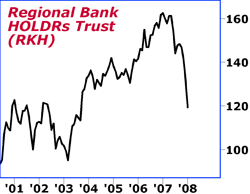
Just look at this chart of the Regional Bank HOLDRs Trust, or RKH.
Bob: This is essentially an exchange-traded fund, or an ETF, right?
Mike: Right. It holds shares of 19 top U.S. banks. You can see it has already tanked from the 165 area to just over 120. But with all these loan losses piling up, regional bank stocks could get hit even harder. I think it could fall all the way to its 2003 low of around $90 a share.
Bob: Name names. Name some banks that you think could get stuck with big construction loans going sour.
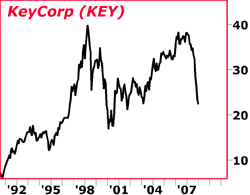 |
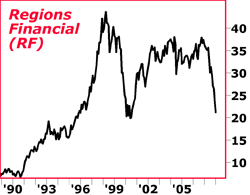 |
Mike: KeyCorp, for example. The bank has $3.7 billion in loans to builders and developers.
Now, suddenly, the credit market turmoil is impacting the valuation of these loans. It's reported a $120 million bad loan hit — and I think a lot more is coming down the pike.
Bob: Who else?
Mike: Regions Financial. It's the 17th largest bank in America. But it was forced to boost its loan loss provision to $360 million in Q4 from $90 million in Q3. That's a four-fold increase. And from just one quarter to the next.
Bob: OK. I see what's happening here in Florida. And I know it's happening in California, Nevada and pretty much all over the country. But everything you've said so far is all in one sector — housing and mortgages. So why can't an investor just avoid this sector and go on with his life?
Mike: Because now it's spreading to the rest of the credit world, and it's spreading fast. The delinquency rate on auto loans is surging. The delinquency rate on credit cards is surging. The delinquency rate on second mortgages and lines of credit are through the roof. And the banks in this sector are getting hit hard.
Bob: Like who, for instance?
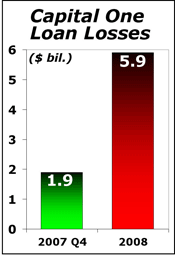
Mike: Capital One Financial. Big losses. Not just from its home equity loan division, which it's shutting down, but everywhere you look, you see big credit deterioration.
Capital One took a whopping $1.9 billion provision to cover the mess in the most recent quarter, and Wall Street thought that was a shocker. Now, looking ahead to 2008, it's forecasting another $5.9 billion in charge-offs. Plus, look at ...
Bob: Hold it for a sec, Mike. Suppose I have a CD or a money market with one of these banks? Am I going to lose money?
Martin: Let me answer that question. You're insured by the FDIC up to $100,000. So unless you have uninsured deposits, you'll come out OK. But if you're an investor, that's a different story. If you get stuck holding shares in a failed bank, you lose everything.
Bob: Not exactly reassuring. What should I do?
Martin: No matter what, I think you're better off keeping your cash in Treasuries plus some foreign currencies. And no matter what, you should be out of all U.S. bank stocks, whether they're on Mike's target list or not.
Bob: But isn't there a silver lining in this somewhere? If I wait a short while, isn't there a big profit opportunity in this?
Martin: You don't have to wait. You can turn this crisis into huge profit potential starting right now, and we'll talk about that in a moment.
Bob: OK, Mike. Domino #1 — the builders. Domino #2 — the subprime lenders. Domino #3 — the regional banks. Domino #4?
Mike: Other big financial companies! I'm not talking bankruptcy. At least not yet. But you'll see such huge losses, their stock will fall almost as if they were headed for bankruptcy themselves.
Take American Express. It's not going bankrupt. But its cardholders are falling behind in their payments.
Bob: American Express cardholders? But aren't they the ones who are supposed to have plenty of dough? I can't believe that even Amex cardholders are going delinquent!
Mike: They are. Their delinquency rates are surging. And guess where it's happening most: In housing bust states like California and Florida. That just goes to show you how deeply the housing virus is penetrating ... and how quickly it's infecting other kinds of credit.
Bob: Who's going to get hit?
Mike: Companies like Washington Mutual, MBIA, National City, Citigroup, Bear Stearns.
Bob: OK. I got all the names I want for now. So if I understand you right, what you're saying is that, in some cases, the companies will go bankrupt. In some cases, they won't be going under, but they'll just be swimming in red ink — their stock will crater. And in other cases, I assume there will be takeovers, right?
Mike: Yes, or more likely, take- unders .
Bob: Takeunders?
Mike: Right. Not a takeover, where the shareholders leap for joy. But a takeunder, where shareholders should consider themselves lucky if they can get pennies on the dollar. In other words, forced, penny-ante mergers.
Bob: So technically, it's almost bankrupt but it gets a white knight ...

Martin: Guys, I think you're splitting hairs. No matter what the outcome — seas of red ink, takeovers, takeunders — the bottom line is that the price of the stock goes into the gutter . Investors get nearly wiped out.
So, let's go back to the big picture here. Let me sum up with three points.
Point #1. The end of 2007 did not bring an end to the housing and mortgage mess. Quite the contrary, all indications are that 2008 is going to bring much bigger surprises and much bigger disasters — in housing and in mortgages. Namely: A wave of bankruptcies.
Point #2. It's not just mortgages any more. It's builder loans. It's credit cards. It's auto loans. All kinds of credit are being infected.
Point #3. You talk about dominoes. That's a good metaphor. But this reminds me of the Ebola virus. It's spreading like wildfire. The speed is unlike most analysts had imagined, and it's accelerating.
Domino #5
Bob: OK. But my question is this: Will it spread strictly to other sectors that are indirectly related to housing and mortgages? Or will it also spread to sectors that have nothing to do with housing and mortgages?
Mike: Both.
Bob: Give me an example.
Mike: Tech stocks. That's Domino #5.
Last year, I was watching CNBC and I heard the dumbest, most naive comment I'd ever heard in my entire career. The analyst was saying, "Tech is a safe haven for investors. Tech companies don't write mortgages. So they're the place to hide from the mortgage crisis."
I immediately sat down and wrote an issue saying that tech was the next sector to get clobbered.
Bob: And that's what happened starting on the first trading day of the new year, isn't it?
Martin: In the first few trading days of the year, the techs had the worst start of any year since the Nasdaq was first created over 30 years ago. If that isn't a warning signal, I don't know what is.
Bob: Which tech companies are going to be the first victims?
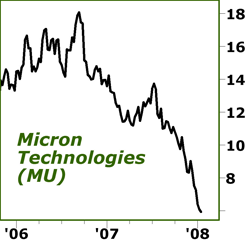
Mike: Micron Technologies has already gotten killed. Look how its shares have gone into the gutter! Next it's going to be Amazon. Plus, IBM and Intel.
Bob: Amazon? But people buy tons of stuff on Amazon. Not just books but also doo-dads. It's a giant Web company with a well-oiled business model.
Mike: It's a retailer. That's all. It just sells stuff — stuff that people can do without when cash is tight and credit is non-existent. Here you've got a retailer, Amazon, that's treated like it's some kind of Internet god. And you've got a retailer that's selling for 93 times its earnings. That's more than six times the valuation of other retailers.
You know retailers are getting killed. You know Amazon is a retailer. So to me, it's a no-brainer that Amazon is going to get killed. It's just a matter of when.
Bob: When do you think?
Mike: Right now.
Bob: Who else is going to be a part of Domino #5, in your opinion?
Mike: It's going to hit the big suppliers of technology to the corporate world. IBM. Hewlett Packard. Intel.
Larry: Bob, let me interject here for a moment. Because I've run a few businesses, and what Mike is telling you is basic common sense. If you're in business and your customers cut spending, you have to cut spending too. If you don't have revenues and can't get credit, you can't buy more equipment. That's why stocks like IBM, Intel and Hewlett Packard are cracking under the pressure.
Bob: How far could they fall, Mike?
Mike: I showed you a moment ago how one of the first to get smacked, Micron Technologies, has already lost about two-thirds of its peak value.
I don't know if the IBMs, the Intels and the HPs of the world are going to fall that far. But I do know they're next in line in this parade of pain.
Bob: I sure hope folks are paying very close attention to what Mike is saying. Because anyone who listened to Mike two years ago, when he said housing stocks could be down 60%, 70% or 80% could have avoided that decline before it even began. Now, he's giving us all a heads-up about the next group likely to suffer similar losses.
Martin: May I take this back up to a macro level?
Bob: Go ahead, Martin.
Martin: The recession has barely begun. And already, old debt is going bad. Already, the new debt — credit — is much harder to get.
Bob: You're right. I hadn't thought of it quite that way. Typically, you get these kinds of credit issues only after we're deep into a recession. Now, it's happening even before the recession gets underway.
Martin: And typically, for the consumer, the recession brings just a job squeeze. Now, it's a three -way trap: The credit crunch! Job insecurity! Inflation!
Bob: Give me proof.
Martin: Come on, Bob. Do you really need any more proof than you've already got?
Bob: Humor me.
Martin: OK. Start with the credit crunch. The Fed just surveyed the banks, and the banks themselves said they're tightening up their standards dramatically. Try and get a subprime mortgage today. It's virtually impossible. Try to buy a home with no money down. It's like finding hen's teeth. All that new-fangled financing is gone now. Out the window.
Bob: What about evidence of inflation?
Martin: You saw the huge inflation numbers for November — not just double-digit, but even triple-digit in some sectors. The PPI posted the biggest jump since 1973 — a sure sign of even greater consumer price inflation ahead. Import prices surged by double-digits. That means 80% of the stuff you buy at Wal-Mart is about to rise in price, courtesy of the falling dollar.
Bob: And job insecurity?
Martin: Give me a break. You want harder evidence than the latest jobs report?
What to Sell
Bob: Investors who followed your guidance a long time ago to get out of all this stuff are in good shape. But what do you say to folks who didn't follow you, who listened to the pitch from brokers — that these housing stocks were "great bargains," that the mortgage and banking stocks were "even better bargains"? What do you tell them ?
Martin: Get out now. Sell. Use any Fed-inspired rallies to sell the stocks in the sectors Mike warned you about.
Then , don't just hole up in your basement shelter waiting for the storm to pass. Instead, harness the amazing power of the storm. Aim to build your wealth in this situation.
Bob: Do you mean by selling short?
Martin: No, we don't recommend short selling. My Dad sold short in the 1930s. And I'll never forget the stories he used to tell me. How he borrowed $500 from his mother in 1929, sold short some stocks, and turned $500 into $100,000 — over $1 million in today's money. But he also told me how he sweated bullets when the market turned against him because of the unlimited risk.
Fortunately, in the twenty-first century, you don't have to sell short any more. You can use revolutionary investments that simply didn't exist in my Dad's time.
Bob: How do they work?
Martin: They're designed to let you set the same exact goal you set for any other kind of investment: Buy low. Sell high. If they go down, you lose. If they go up, you win.
The difference is, when stocks you've targeted go down , these investments are designed to go up ! In fact, if you've still got investments in your portfolio that are vulnerable to this crisis, my opinion is that you should seriously consider these vehicles for protection.
Bob: Yes! And you promised you were going to name them.
Martin: Two investments that everyone with stocks in their portfolio — any stocks — should buy:
- PSQ , the ProShares inverse ETF that targets the Nasdaq-100 Index and ...
- SBB , their inverse ETF that targets the S&P SmallCap 600 Index.
These are like ordinary ETFs, but with one critical difference: They're designed to move inversely to the market.
Bob: Please explain.
Martin: Let's say the market goes down 10%. Then, this ETF is designed to go up 10%. It's that simple. Of course, it also works in reverse. So if the index goes up, the ETF goes down. But the idea here is that the profits you make in these can help offset any losses you suffer in the rest of your portfolio.
Bob: I like that. I like the idea that I can sleep nights even when the market is sinking. But suppose I want to go beyond protection. Suppose I want to use this situation to build my wealth.
Martin: I think that's a valid goal — not just for yourself and your family, but also for the general good. The more that investors can build wealth in bad times, the more the country will accumulate a reserve of buying power that could be instrumental in helping to bring about a recovery in the markets down the road.
So get rich in bad times. Then use that wealth to buy great bargains when most investors are too shell-shocked to buy them.
Bob: Thank you, Martin. Thank you, Mike and Larry. Again, I want to congratulate you for your tremendous foresight in 2007 ... plus your great insights today.
And thank you , our subscribers, for your participation in this conference. Have a great year!
This investment news is brought to you by Money and Markets . Money and Markets is a free daily investment newsletter from Martin D. Weiss and Weiss Research analysts offering the latest investing news and financial insights for the stock market, including tips and advice on investing in gold, energy and oil. Dr. Weiss is a leader in the fields of investing, interest rates, financial safety and economic forecasting. To view archives or subscribe, visit http://www.moneyandmarkets.com .
Money and Markets Archive |
© 2005-2022 http://www.MarketOracle.co.uk - The Market Oracle is a FREE Daily Financial Markets Analysis & Forecasting online publication.



